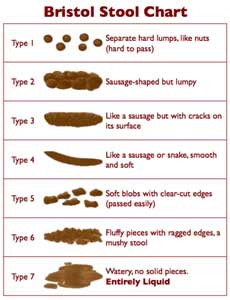You’ve been diagnosed as needing a gluten-free diet, and you’ve been following the diet for a while – what follow up tests should you expect?
Our daughter goes annually now to see her paediatrician* for a checkup – it used to be every six months when she was younger, and newly diagnosed, but we’re old hands at this now, and she’s doing well.
We discuss:
- her growth (height and weight) against the standard growth charts, to be sure she’s growing in all the right places and directions
- her eating and sleep patterns
- her general health and her rate of maturation (puberty)
- and yes, the dreaded poo questions. Have you all seen the poo chart? It has 7 photos of different stool samples, and she has to identify her “standard product”. Fun for all the family to play …

The aim should be to produce something like number 4!
Then the doctor orders some tests – usually some blood tests to be sure that she is sticking to her diet and that everything is working OK, and a bone age scan.
This last isn’t the same as a bone density scan (which I imagine you would need as an older person), but assesses how well her bones are growing against her chronological age. In the ‘old days’, soon after diagnosis, her bones were several years behind her real age, but they seem to be catching up now.
Then that’s it for another year.
Other tests you might receive include:
- blood tests for vitamin and mineral deficiencies
- thyroid screen – this is because coeliacs have a greater chance of getting an underactive thyroid, with weight gain, feeling tired, cold and depressed. (An overactive thyroid – also possible – can cause weight loss)
- a bone density scan – to check for osteoporosis, a known risk for people who fail to absorb nutrition well.
- liver enzyme tests – just to check everything is working OK
And of course any other tests that might be needed in your specific circumstances, such as lactose intolerance tests.
Healing progress can be monitored by regular retests. Children generally recover within a few months; adults may take several years. I hope your recovery will be swift – and that you go back to scoring no.4 on the Bristol stool chart!
*Here in the UK, the paediatrician is the consultant your child (0-16) is referred to if there is some specialist problem that your GP (general practitioner) can’t deal with. The GP is the frontline family doctor, and the consultants are the secondline health providers based in hospitals. Healthy children – or those with straightforward childhood illnesses – would never see a paediatrician. My two other children haven’t, despite having had asthma, a heart murmur and broken limbs …
 |
I’ve written a book summarising what we’ve learnt over 20 years of dealing with the gluten free diet, and it might be just what you’re looking for. It packs the lessons we’ve learned into what I hope is a helpful and straightforward guidebook. It’s available on Amazon, as a paperback or for your Kindle… |





i really love this chart, really helped thanks Gillian.
Hi Gillian – I’m glad it helped!